Understanding Felony Charges and Their Role in Employment Background Checks
Felony charges In the hiring process, background checks are an essential tool for employers to assess a candidate’s qualifications and history. These checks verify details such as criminal records, employment history, and educational background, all critical components in ensuring a trustworthy and compliant workforce.
A major focus of employment background checks is a candidate’s criminal history, particularly felony charges. Employers often use criminal records to assess the risk a candidate might pose to the workplace, customers, and the organization as a whole. Felony charges are considered more serious than misdemeanors and often carry significant weight in hiring decisions.
What Are Felony Charges?
Felony charges refer to serious criminal offenses that are punishable by imprisonment for over a year, often in a state or federal prison. These charges are distinguished from misdemeanors, which are less severe offenses typically punishable by less than a year in jail or fines.
Felonies can range from violent crimes such as assault or robbery to non-violent offenses like fraud or drug trafficking. Due to the serious nature of felony charges, they can significantly influence hiring decisions, particularly for positions that require high levels of trust, responsibility, or safety.
The Impact of Felony Charges on Employment
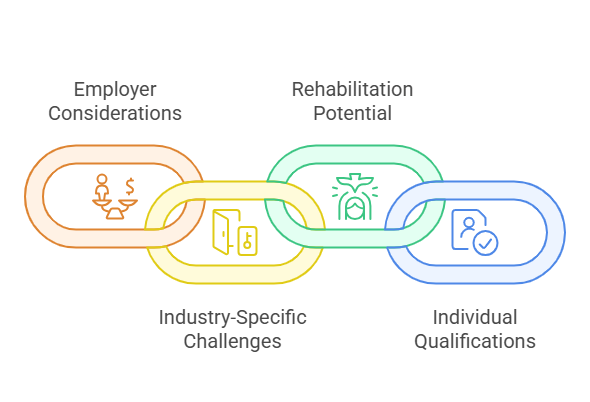
Employers take felony charges into serious consideration because they may indicate potential risks, such as dishonesty, violence, or the inability to perform tasks in a lawful manner. Felony convictions can hinder job prospects in various industries, particularly in sectors such as finance, healthcare, education, and law enforcement.
However, the impact of felony charges on employment is not always straightforward. Employers must evaluate the relevance of the offense to the job in question and consider the potential for rehabilitation and the individual’s qualifications.
Why Employers Should Consider Felony Charges in Background Checks
- Safety Concerns: Felony charges related to violence or dishonesty may pose significant risks to the workplace, making background checks crucial for safeguarding employees and clients.
- Legal Compliance: Many industries are regulated by laws that require employers to conduct background checks, particularly those involving vulnerable populations, sensitive information, or high-security positions.
- Company Reputation: Hiring individuals with felony convictions, especially in cases of fraud or financial crimes, may damage a company’s public image and erode customer trust.
The Importance of Thorough Background Checks
Employers who conduct thorough background checks, including an assessment of felony charges, can make more informed decisions. These checks help verify the candidate’s criminal history, job qualifications, and any previous red flags, which ultimately lead to safer and more compliant workplaces.
By including felony charge checks, businesses are not only protecting their interests but also ensuring that they follow compliance regulations like the Fair Credit Reporting Act (FCRA), which governs how criminal history can be used in hiring decisions.
Felony Charge Consideration vs. Impact on Employment: Data Table
| Aspect | Felony Charge Consideration | Impact on Employment |
|---|---|---|
| Type of Crime | Felonies are serious crimes punishable by over a year in prison. | Can affect hiring in sensitive or high-risk industries. |
| Job Relevance | Charges may not always relate to the job, but certain felonies (fraud, violence) can be highly relevant. | May disqualify candidates for positions requiring trust, financial management, or security clearance. |
| Safety Risks | Felony charges involving violence or dishonesty raise concerns about workplace safety and employee integrity. | Employers in high-security or customer-facing roles may be reluctant to hire those with felony convictions. |
| Legal Considerations | Employers must comply with Ban the Box laws, EEOC guidelines, and other regulations regarding the use of felony records in hiring. | Employers need to navigate legal boundaries and ensure non-discriminatory hiring practices when considering felony charges. |
| Rehabilitation Potential | Some employers may offer second chances, particularly for older offenses or when the candidate demonstrates rehabilitation. | Felony records can be a barrier for candidates with no relevant rehabilitation, but may be overlooked for less serious offenses or with strong qualifications. |
| Company Reputation | Hiring candidates with felony records, particularly for financial or ethical violations, could damage a company’s reputation. | The decision to hire someone with a felony can affect public perception and client trust, particularly in the financial or legal industries. |
Evaluating Background Check Providers for Felony Record Screening
When selecting a background check provider, it’s crucial to evaluate how felony records are handled. Some companies prioritize speed, while others focus on comprehensive coverage or compliance with legal standards. Understanding these distinctions helps businesses choose the right partner for their needs, particularly when felony records are involved.
RapidHireSolutions: A Comprehensive Approach to Felony Background Checks
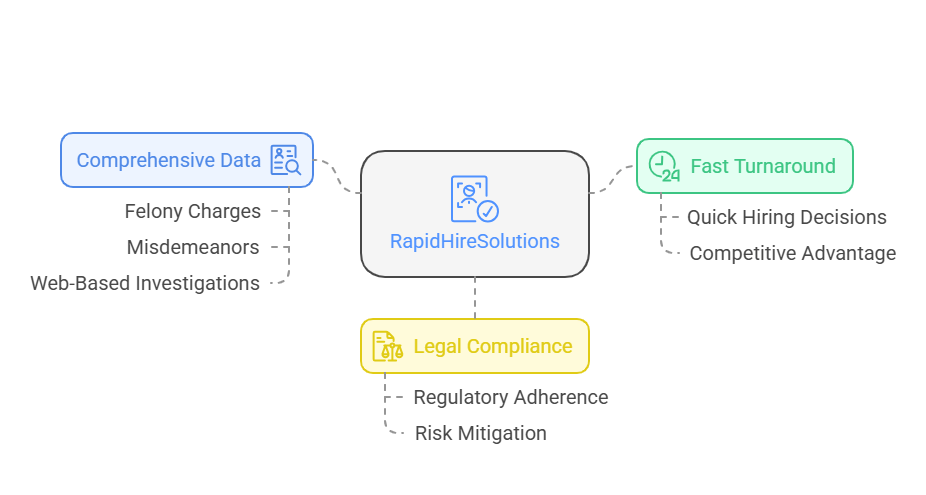
RapidHireSolutions stands out for its quick and thorough felony background check services. The company excels in delivering results within 24 hours, far outpacing many competitors who take days or even weeks to provide the same information. Additionally, RapidHireSolutions covers a broad spectrum of criminal history, ensuring that all felony records, including lesser-known infractions, are included.
Key Strengths:
- Fast Turnaround: RapidHireSolutions guarantees 24 hour turnaround times, enabling businesses to make informed hiring decisions quickly.
- Comprehensive Data: Their checks cover felony charges, misdemeanors, and even deeper web-based investigations to provide a full picture of a candidate’s criminal history.
- Legal Compliance: The company ensures compliance with key regulations like FCRA and EEOC, safeguarding businesses from legal challenges related to employment decisions based on criminal history.
Competitors in the Background Check Industry
While many competitors offer felony background checks, the range of services and the speed at which results are provided vary significantly. Some may offer a quick turnaround, but the accuracy and scope of their data might be limited. Others may provide more comprehensive coverage, but at the cost of slower response times.
Common Features of Competitors:
- Longer Turnaround Times: Many competitors take 20 to 30 days to return felony background check results, delaying the hiring process.
- Limited Coverage: Some providers focus solely on basic criminal records, missing critical data that could influence hiring decisions.
- Partial Compliance: While competitors typically follow basic legal regulations, full adherence to FCRA, EEOC, and local laws may be inconsistent, exposing businesses to potential legal risks.
Comparison: RapidHireSolutions vs. Competitors
| Feature | RapidHireSolutions | Competitors |
|---|---|---|
| Turnaround Time | ✅ 24 hours | ❌ 20-30 days |
| Coverage | ✅ Includes felony, misdemeanor, and web-based checks | ❌ Basic criminal records only |
| Compliance | ✅ Fully compliant with FCRA, EEOC, Ban the Box laws | ❌ Partial compliance in some areas |
| Customer Support | ✅ 24/7 support | ❌ Limited business hours |
| User Experience | ✅ Easy-to-use platform | ❌ Complex interface |
| Pricing | ✅ Cost-effective for high-quality service | ❌ Expensive for limited services |
Why Choose RapidHireSolutions Over Competitors?
Speed and Efficiency
RapidHireSolutions offers a clear advantage when it comes to speed. With a turnaround time of 24-48 hours, employers can avoid the long wait times that often come with competitor services, which can take up to two weeks. This fast service is especially valuable when employers are under time constraints to fill positions quickly.
Comprehensive and Accurate Data
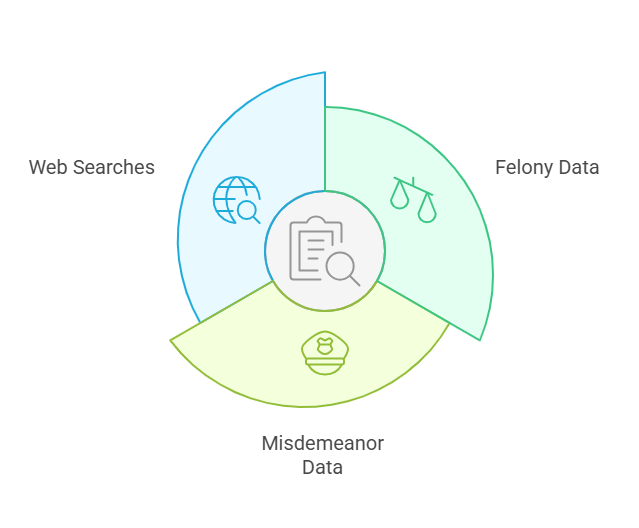
Unlike some competitors, RapidHireSolutions doesn’t just focus on basic criminal history. Their background checks include detailed felony and misdemeanor data, as well as comprehensive web searches that competitors often overlook. This thorough approach ensures that employers have the complete background they need to make informed decisions.
Compliance with Legal Standards
Staying compliant with regulations like FCRA, EEOC, and Ban the Box laws is essential to avoid legal challenges. RapidHireSolutions is fully compliant with these regulations, ensuring that employers can confidently make decisions based on accurate and legally obtained criminal history data. In contrast, some competitors fall short in certain areas, which can leave employers exposed to legal risks.
24/7 Customer Support
With round-the-clock support, RapidHireSolutions ensures that businesses have help whenever they need it. This is particularly important for businesses that need assistance outside regular office hours. In contrast, many competitors only offer support during business hours, which can create delays in critical hiring decisions.
Understanding the Value of Comprehensive Felony Background Checks
Felony background checks are a vital part of the hiring process, especially for positions involving public trust, sensitive data, or security. Choosing a background check provider that offers quick turnaround times, detailed records, and full legal compliance ensures a smooth, legally compliant hiring process.
By partnering with RapidHireSolutions, businesses gain access to a provider that balances speed, accuracy, and legal compliance, helping them make better-informed hiring decisions.
Legal Considerations in Hiring Decisions Involving Felony Charges
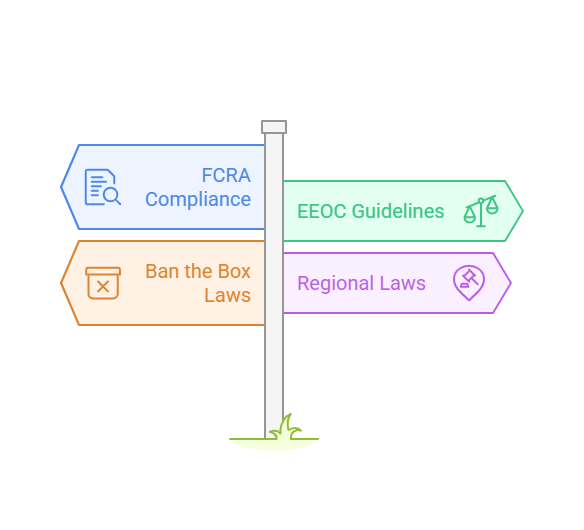
When employers consider felony charges during background checks, they must navigate a complex legal landscape. Various laws regulate how criminal history information can be used in employment decisions, ensuring fairness and protecting both employers and candidates. Here’s a look at the most important regulations businesses should keep in mind when dealing with felony charges during the hiring process.
Fair Credit Reporting Act (FCRA)
The Fair Credit Reporting Act (FCRA) sets guidelines for how background checks can be conducted and used in hiring decisions. It requires that employers obtain written consent from job candidates before performing a background check. Additionally, if an employer decides not to hire a candidate based on information found in a background check, they must provide a pre-adverse action notice, giving the candidate an opportunity to dispute the findings.
The FCRA aims to ensure that background checks are conducted fairly and that employers do not rely on outdated or inaccurate information. This is particularly relevant for felony records, as the age of the conviction can play a significant role in employment decisions.
Equal Employment Opportunity Commission (EEOC) Guidelines
The Equal Employment Opportunity Commission (EEOC) provides guidance on how employers should treat felony convictions during the hiring process. According to EEOC guidelines, employers must consider several factors before deciding whether a felony conviction disqualifies a candidate from employment. These factors include the nature of the offense, the time passed since the conviction, and the relevance of the offense to the job at hand.
The EEOC also recommends that employers use individualized assessments to determine whether a felony conviction should impact a hiring decision, rather than applying blanket policies that automatically exclude candidates with criminal records. This is to prevent discrimination based on race, national origin, or other protected categories, as felony convictions disproportionately affect minority groups.
Ban the Box Laws
“Ban the Box” laws are designed to prevent employers from asking about a candidate’s criminal history during the initial stages of the hiring process. These laws are intended to give all job applicants an opportunity to be considered based on their qualifications before being judged for their criminal history.
In many states and localities, employers are prohibited from inquiring about a candidate’s felony conviction until after an initial interview or conditional offer of employment has been made. However, the specifics of Ban the Box laws vary by jurisdiction, and employers must remain informed about the regulations in their area to ensure compliance.
Other Regional Laws and Considerations
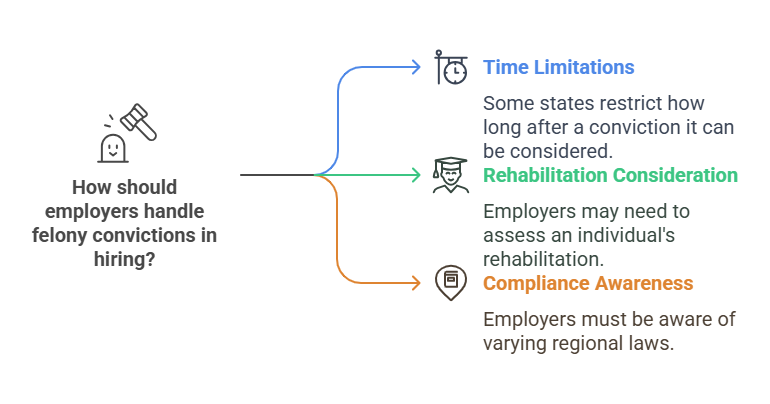
In addition to federal regulations, many states and localities have specific laws governing how felony charges can be considered in hiring decisions. For example, some states limit the period of time during which a felony conviction can be used in hiring decisions, while others may require that employers consider the rehabilitation of an individual before making a decision.
Employers must ensure they are aware of and comply with these regional laws, which can differ significantly depending on the location of their business and the jurisdictions in which they operate.
Frequently Asked Questions (FAQs)
Can an Employer Discriminate Against Someone with a Felony Conviction?
While employers have the right to consider felony convictions when making hiring decisions, they must follow specific legal guidelines to avoid discrimination. Employers must consider factors such as the nature of the crime, how much time has passed, and the relevance of the conviction to the job being offered. Discriminating against candidates based on a felony conviction, particularly in a way that disproportionately affects certain racial or ethnic groups, can violate federal discrimination laws.
What is the Impact of a Felony Conviction on Employment Opportunities?
A felony conviction can significantly impact a person’s ability to secure employment, particularly in industries where criminal background checks are required. However, the effect of a felony conviction on employment opportunities can vary depending on the type of job, the company’s policies, and the candidate’s rehabilitation efforts. In some cases, employers may overlook a felony conviction if the candidate demonstrates the skills and qualifications necessary for the job.
How Can Employers Navigate Hiring Decisions with Felony Convictions in the Background Check?
Employers should approach hiring decisions involving felony convictions with care, ensuring they follow legal guidelines and assess the candidate on a case-by-case basis. It’s important to consider the nature of the offense, how long ago the conviction occurred, and how relevant it is to the job in question. Additionally, employers should remain mindful of discrimination laws and avoid automatic exclusions based solely on criminal history.
How Can Employers Ensure They Are Following All Relevant Laws When Considering Felony Convictions?
Employers can ensure compliance by staying informed about federal, state, and local laws that govern the use of criminal history in hiring decisions. It's important to consult legal experts or HR consultants familiar with these regulations and to regularly update hiring policies to reflect any changes in the law. Using a reliable background check service like RapidHireSolutions, which stays up-to-date with compliance requirements, can also help ensure that employers follow the right procedures.
Can Felony Charges Be Expunged, and How Does That Affect Employment Background Checks?
In some cases, individuals with felony convictions may be eligible for expungement, which involves the legal removal of the conviction from their criminal record. If a conviction is expunged, it generally will not appear in background checks. However, whether or not a felony charge has been expunged can depend on state laws and the specific details of the case. Employers must consider expungement laws in their jurisdiction and verify the accuracy of any criminal record information provided in background checks.
How Does RapidHireSolutions Ensure Compliance with Laws Regarding Felony Charges in Background Checks?
RapidHireSolutions is committed to ensuring full legal compliance in all of its background check services. The company’s processes adhere to the Fair Credit Reporting Act (FCRA), EEOC guidelines, and any relevant state or local regulations, including Ban the Box laws. This ensures that employers receive accurate, legally compliant information when conducting felony background checks, allowing them to make informed and fair hiring decisions.
Conclusion
In the hiring process, felony charges are an important consideration that requires careful handling and compliance with various legal standards. Employers must balance the need to protect their business and ensure safety with the legal rights of candidates, particularly when felony convictions are involved. With the right background check provider, such as RapidHireSolutions, businesses can make confident, compliant decisions while minimizing the risk of legal exposure.
Felony background checks are an essential tool for making informed hiring decisions, and with proper legal understanding and an effective background check service, employers can navigate these decisions with confidence and fairness. RapidHireSolutions stands as a trusted partner for businesses looking for quick, comprehensive, and legally compliant background checks, helping to make the hiring process smoother and more secure.

